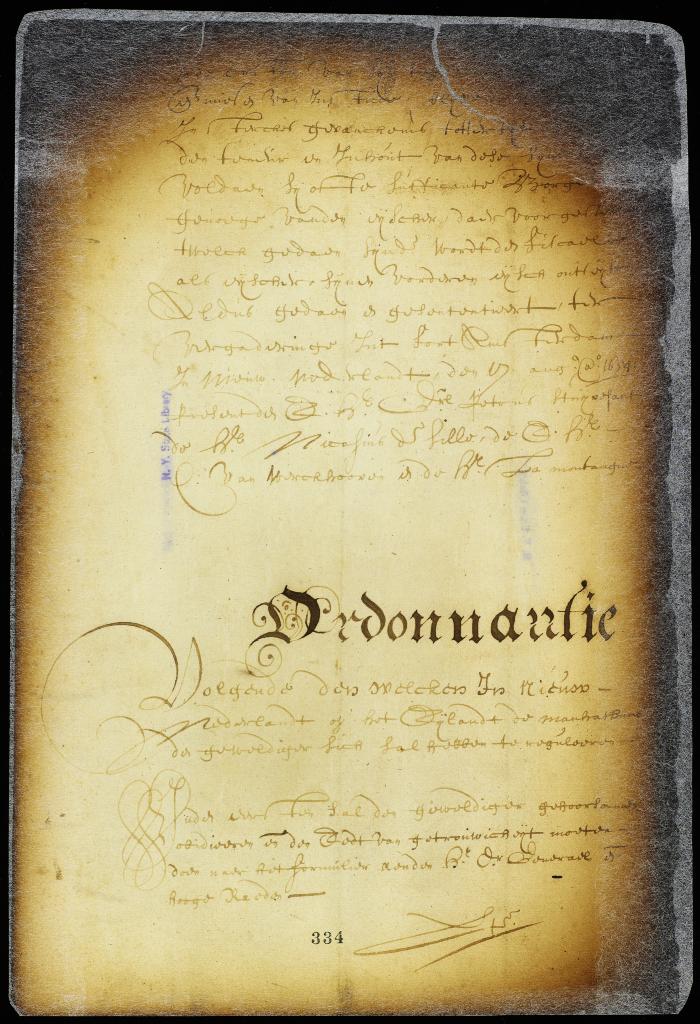According to which the provost marshal[1] in New Netherland on the island of Manhattan is to regulate himself.
First. The provost marshal shall be obedient and compliant, and must take the oath of allegiance to the honorable director-general and high council according to form.
Furthermore, he shall keep his residence in Fort New Amsterdam where he will be assigned quarters; and he will be provided with keys, locks and chains of the prison; and he shall be obligated to take good care to lock up and feed the prisoners in the manner ordered by the fiscal.
Also, every morning and evening he is to visit the prisoners, examine the locks and take particular care that no fire, rope, iron or sharp objects be left with the prisoner.
Also, the provost marshal shall not secure anyone with heavier or lighter irons than he is ordered to do by the fiscal, unless the prisoner lies in wait for night in order to break out, in which case he shall do his best to maintain security and then report the matter to the fiscal.
And, if it happens that a prisoner or prisoners be brought in by schouts or ships' captains to the provost marshal to be locked up, he shall have the authority to place the same immediately in confinement; however, he must notify the fiscal at the earliest opportunity and deliver in writing the names of the injured parties and of the prisoners.
Also, the provost marshal may separate and imprison all soldiers whom he finds fighting with unsheathed swords in the fort or on the street.
Also, he shall impose a fine of 2 stivers on all soldiers whom he finds without side arms, or in the evening, after nine o'clock, with candles in their quarters.
Also, the provost marshal shall receive for the incarceration of each soldier 10 stivers, and for each citizen or officer 20 stivers.
Also, for major officers or respectable persons occupying his quarters, 30 stivers, and for the board in proportion, according to the regulation devised thereon.
Also, soldiers who avoid parade, either by leaving too soon or arriving too late, shall not only serve double sentry duty but shall pay the provost marshal a fine of 2½ stivers, and if anyone leaves his weapon unattended on guard duty, it shall be held for safekeeping until it is redeemed with the payment of 2½ stivers.
The provost marshal shall receive twelve stivers per day for the board of a common prisoner, on the condition that he provide them weekly with the equivalent of the ordinary ration allowed by the Company, namely:
1½ lbs. of meat
¾ lbs. of bacon
1 lb. of fish
1 gill of oil
1 gill of vinegar
A suitable pottage and a supply of bread per week.[2]
Also, the provost marshal shall not be at liberty to absent himself from the fort at night after the guard is posted, except with the special knowledge of the fiscal and by permission of the director-general. And, the provost marshal shall receive for his salary the sum of 24 Carolus guilders per month, payable quarterly, exclusive of his board stipends and extraordinary incomes mentioned above.
And, if it should happen that the provost marshal, with his assistants, is not strong enough to perform his duties because of the strength of hostile forces, in the absence of the fiscal, the director-general, or, in the absence of the latter, the commanding officer, shall, at his request, detail some soldiers from the guard to enable him to execute his orders.
If the provost marshal arrests one or more soldiers, no person, whosoever he may be, shall oppose him or secure the prisoner, on pain of being punished according to the law.
The provost marshal shall be obligated to assist the fiscal in making arrests, inspections and in executing the duties of his office. Thus done at the session of the honorable director-general and high council, 20 August 1654 in New Amsterdam in New Netherland.
Rights: This translation is provided for education and research purposes, courtesy of the New York State Library Manuscripts and Special Collections, Mutual Cultural Heritage Project. Rights may be reserved. Responsibility for securing permissions to distribute, publish, reproduce or other use rest with the user. For additional information see our Copyright and Use Statement Source: New York State Archives. New Netherland. Council. Dutch colonial council minutes, 1638-1665. Series A1809. Volume 5.





